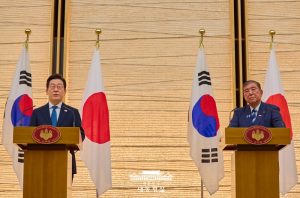South Korean President Lee Jae-myung held a summit meeting with Japanese Prime Minister Ishiba Shigeru on September 30 in Busan, a port city on South Korea’s southeastern tip. Days before Ishiba’s departure, the two leaders reaffirmed the importance of strengthening relations between South Korea and Japan amid the rising leverage of North Korea and the emerging trilateral China-North Korea-Russia in the region.
“This summit is truly the epitome of shuttle diplomacy,” Lee was quoted as saying in local media reports. Calling South Korea and Japan neighbors who share a front yard, Lee emphasized the importance of active exchanges for joint development while pointing out that the two countries can become close not only in the social and cultural fields but also in the security sector.
Highlighting the summit meeting with Lee, Ishiba said the two countries can “engage in exchanges frequently and strive to achieve the results of shuttle diplomacy,” according to local media. He also added that it is meaningful for him to conclude his chapter as the prime minister through a summit meeting with Lee. The trip to Busan was Ishiba’s last diplomatic engagement before he is officially replaced as LDP president and Japan’s prime minister.
The two leaders agreed to form a consultative body to grapple with social issues of common concern, such as a low birth rate, an aging population, balanced national development, agriculture, disaster management, and suicide prevention measures. Such an agreement seems to be Lee and Ishiba’s strategy to formalize diplomacy between the two countries as a means to stably manage their bilateral relations.
Despite North Korean leader Kim Jong Un’s recent remarks showing his strong intention not to give up his nuclear weapons, Lee and Ishiba reaffirmed their unchanged will to denuclearize the Korean Peninsula, according to Kang Yoo-jeong, a spokesperson of the South Korean Presidential Office.
In August, Lee visited Tokyo to hold a first summit meeting with Ishiba ahead of his visit to Washington for a first meeting with U.S. President Donald Trump at the White House. Lee’s decision to drop by Tokyo ahead of his visit to Washington was widely interpreted as his intention to reassure the policymakers and politicians of Washington and Tokyo who doubted his willingness to strengthen relations with Japan.
During his presidential elections, Lee had been accused of taking a hawkish stance on Japan. Lee, a liberal icon, has long demanded that Japan apologize for the “comfort women” who were forced to sexually service the Japanese military during Japan’s colonial rule of Korea between 1910 and 1945. Thus, many observers predicted that he would not be supportive of managing the relations with Japan in the way the U.S. wants to.
For Lee, Tokyo’s insistence on asserting a claim to South Korea’s Dokdo Island and its refusal to make sincere apologies for its serious humanitarian crimes during the colonial and wartime periods are obvious barriers that Tokyo, not Seoul, needs to overcome. To reconstruct the bilateral relations between South Korea and Tokyo through a future-oriented approach, Tokyo should learn from Germany’s continuous efforts to address the horrors committed by Nazi Germany during World War II.
In this context, Ishiba’s ascent to power in Japan was truly welcomed by Seoul, as he has long been more open about Imperial Japan’s war crimes compared to other LDP politicians. With Ishiba on his way out of office, the Lee administration will likely face more challenges in managing relations with Japan, considering the high possibility of a hawkish conservative politician becoming the next prime minister. If so, South Korea and Japan will again confront each other whenever Tokyo makes controversial moves to avoid its historical responsibility.





























